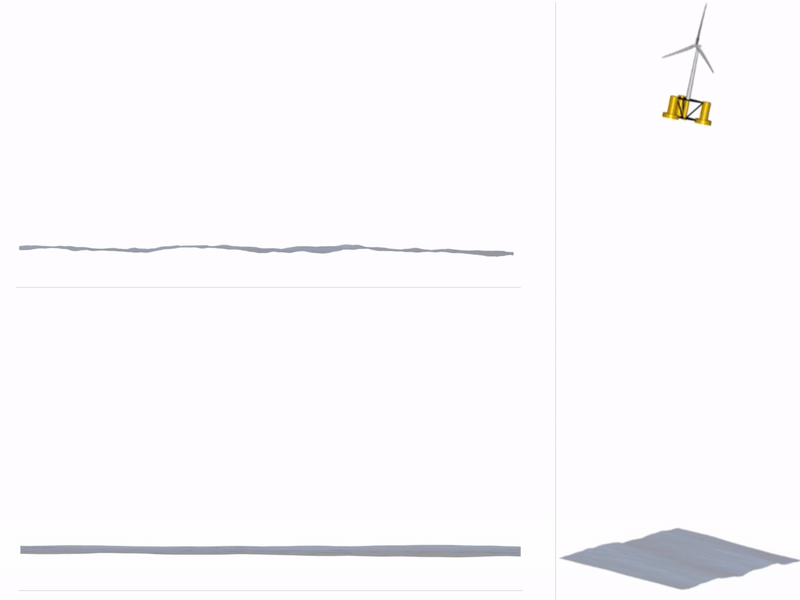Forum
Important Notice for New User Registrations
To combat an increasing number of spam and bot registrations, we now manually approve all new user registrations. While this may cause a delay until your account is approved, this step is essential to ensure the quality and security of this forum.
To help us verify your registration as legitimate, please use a clear name as user name or an official email address (such as a work, university, or similar address). If you’re concerned that we may not recognize your registration as non-spam, feel free to email us at with a request to approve your username.
Comparison of the output in the Turbine BEM and Turbine Simulation Module (normal and tangential force)
Quote from Nathan on 8. December 2023, 16:16Hi all,
as part of my thesis, I am investigating the NREL 5MW turbine and using QBlade to extract the normal and tangential forces in N/m.
Based on the “NREL 5MW Onshore” file provided by QBlade, I extracted the normal and tangential forces over the radius at a wind speed of 3 m/s in the submodule Turbine BEM. The turbine operates with a prescribed pitch and prescribed RPM according to the text file attached below. The existing NREL_5MW blade was used as blades. About the simulation parameters, the default settings were used, and no corrections were applied.
I have defined the same turbine in the Turbine Definition Module. No structural model was used, and the rotor shaft tilt angle and rotor cone angle were set to 0 deg. Dynamic stall and all aerodynamic models were turned off. The wake type is unsteady BEM and the setting “include tip loss” was also turned off. Therefore, the turbine defined in the Turbine Definition module should correspond to that in the Turbine BEM submodule.
In the Wind Turbine Simulation module, I used an uniform wind speed of 3 m/s and RPM according to the txt file. The pitch was set 0 deg. The simulation runs until the forces are constant. If I compare the output of the normal and tangential forces in the Turbine Simulation module with those from the Turbine BEM submodule, they differ, despite the same turbine definition and the same operating conditions were used (see pictures below).
Do you know why there is a discrepancy? Do the calculation methods in the different modules possibly differ?
The corresponding QBlade file is attached below and contains both the Turbin BEM and Turbin simulation models.
Best regards,
Nathanael
Hi all,
as part of my thesis, I am investigating the NREL 5MW turbine and using QBlade to extract the normal and tangential forces in N/m.
Based on the “NREL 5MW Onshore” file provided by QBlade, I extracted the normal and tangential forces over the radius at a wind speed of 3 m/s in the submodule Turbine BEM. The turbine operates with a prescribed pitch and prescribed RPM according to the text file attached below. The existing NREL_5MW blade was used as blades. About the simulation parameters, the default settings were used, and no corrections were applied.
I have defined the same turbine in the Turbine Definition Module. No structural model was used, and the rotor shaft tilt angle and rotor cone angle were set to 0 deg. Dynamic stall and all aerodynamic models were turned off. The wake type is unsteady BEM and the setting “include tip loss” was also turned off. Therefore, the turbine defined in the Turbine Definition module should correspond to that in the Turbine BEM submodule.
In the Wind Turbine Simulation module, I used an uniform wind speed of 3 m/s and RPM according to the txt file. The pitch was set 0 deg. The simulation runs until the forces are constant. If I compare the output of the normal and tangential forces in the Turbine Simulation module with those from the Turbine BEM submodule, they differ, despite the same turbine definition and the same operating conditions were used (see pictures below).
Do you know why there is a discrepancy? Do the calculation methods in the different modules possibly differ?
The corresponding QBlade file is attached below and contains both the Turbin BEM and Turbin simulation models.
Best regards,
Nathanael
Uploaded files:- You need to login to have access to uploads.
Quote from David on 8. December 2023, 18:00Hello Nathanael,
the (classical) steady state BEM iteration in QBlade is slightly different compared to the recently proposed unstead polar BEM that is used in time domain simulations.
You can check-out and compare the functions in detail in the file QTurbineSimulationData.cpp:
- QTurbineSimulationData::steadyStateBEMIteration()
and
- QTurbineSimulationData::calcUnsteadyBEMInduction()
BR,
David
Hello Nathanael,
the (classical) steady state BEM iteration in QBlade is slightly different compared to the recently proposed unstead polar BEM that is used in time domain simulations.
You can check-out and compare the functions in detail in the file QTurbineSimulationData.cpp:
- QTurbineSimulationData::steadyStateBEMIteration()
and
- QTurbineSimulationData::calcUnsteadyBEMInduction()
BR,
David


